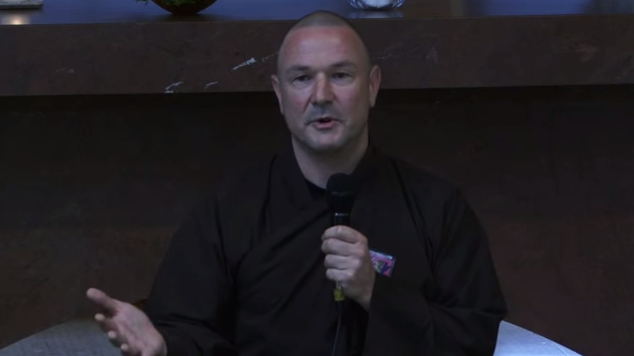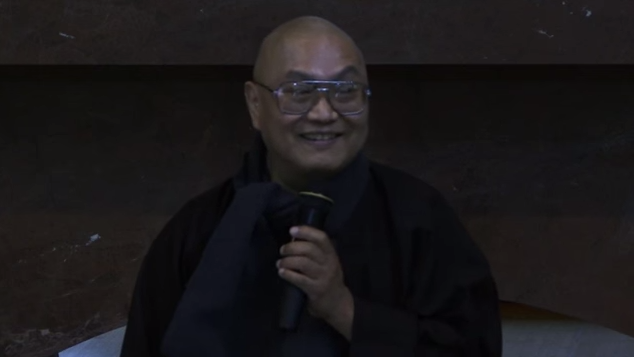What’s the Difference Between Detachment and Non-Caring?
 Brother Ngo Khong: I’ve been confronted by detachment and non-caring in my life. Often I’ve been told I was careless, while I’m thinking I was carefree. I have a certain distance that allows me not to feel pain or when I was hurt by other people. What’s the difference between serenity and indifference?
Brother Ngo Khong: I’ve been confronted by detachment and non-caring in my life. Often I’ve been told I was careless, while I’m thinking I was carefree. I have a certain distance that allows me not to feel pain or when I was hurt by other people. What’s the difference between serenity and indifference?
I think it is a sensitive thing and that’s the practice. Where’s the point between breathing in and breathing out, these two contrary things? To find the link between them, both of them are essential in our lives. We have to be detached and sometimes not care, otherwise things will overwhelm us when we get too much into relationships and topics in the world. We can suffer a lot if we don’t know how to detach from them. On the other hand, we want to be connected.
It’s a question of how I can hold onto things and be connected, when it is the right time to let them go, and am I able to let go? Usually, we cling to things that feel pleasant to us and we like to push things away that feel unpleasant. If we change our view towards this, we can already go beyond this “either or” question. Should I be this or that and how I can be this and that?
You develop a serene mind by stopping, calming down, and seeing that both things are necessary to be with us all the time. For example, true happiness is not to be happy all the time. True happiness is to be aware of my suffering and still maintain a certain happiness.
I have an image for myself that works very well. If I see happiness and suffering as two children, let’s say I’m the mother. I hold their hands and we walk through the world. This child, whom I name Happiness, can’t stop pulling my hand and says, “There’s a carousel! Oh look, there’s an ice cream! I’m so excited, I’m so happy!” It’s always pulling my arm, but there’s another child in my left hand called Suffering. It’s pulling me back and it’s sitting on the floor and is crying. “I’m so sad. I don’t want ice cream.” So we have one child pulling you over there and the other child holding you back. You’re torn as the mother. What do you do?
We can let go of one of them or pay attention to one of them and forget about the other one to suffer or be happy. Will I turn to happiness or will I turn to my suffering? For us, it’s important to be that caring mother in the middle of this to keep the balance and give love, care, and presence to both children. Just to be there.
We can develop these human qualities of love and care. We tend to forget when we say this or that; then we lose the human quality of common sense and put love into something else because it’s a decision we have to make. Should I be detached or should I not care? Should I be connected and what’s good for me? Let’s open our heart, look at people with emotions and needs, and be there for them. To be a mother of two different children and walking around with them.
Having this image and imagining it calms me because I’m aware there’s happiness and suffering in me. Sometimes this happiness child has 70% happiness, but the suffering child has 30% suffering. So I will never be carried away by happiness and be overexcited. To be in contact with both of them is the middle way.
What Happens When Thich Nhat Hanh Passes Away?
Brother Ngo Khong: It’s a fun question with a fun answer. What happens to the Sangha after Thay’s passing? I once said, “If there’s anyone taking over his throne, we don’t have anyone but we have some application forms at the table. So if you feel competent, please fill it out and we’ll choose one of them.” (everyone laughs).
Of course not. To be serious, looking at our insight of vision and interbeing, we are the continuation of Thay. Thay has taught for all these years to continue the treasure of practice and insight that we are all interwoven. We say “You Are, Therefore I Am.” “I Am, Therefore You Are.” This is because that is and that includes we are the continuation. We don’t have to ask ourselves, “Who will be the continuation or will it not continue?” There will be neither nor will be.
 Brother Phap Khong: We would have to present the Dharma in a new way. Thay uses a picture of the silk worms that I like very much. They eat mulberry leaves, digest them, and produce silk. So when we encounter the Dharma, we have to practice in such a way that we digest the mulberry leaves, which is the method of our practice and our experience of the Dharma. We have to produce the silk, not the dead mulberry leaves we chewed.
Brother Phap Khong: We would have to present the Dharma in a new way. Thay uses a picture of the silk worms that I like very much. They eat mulberry leaves, digest them, and produce silk. So when we encounter the Dharma, we have to practice in such a way that we digest the mulberry leaves, which is the method of our practice and our experience of the Dharma. We have to produce the silk, not the dead mulberry leaves we chewed.
The leaves have less value before we become the silk. This is the part where we have to add new things. I was talking with someone who study statistics. When I was in college, I loved statistics. The formula is difficult to remember, but somehow the subject as a group study sample interested me. I was thinking that some day I’ll give a Dharma talk about statistics, group behavior, and action (everyone laughs).
There’s a science of group behavior in statistical matter. There’s a new way of presenting the Dharma, and that keeps our interest. We have retreats for veterans, health practitioners, and people of color. There’s a need for society to encounter with the Dharma. The Wake Up group has a role to present a new way of the Dharma.
Transcribed from a Questions & Answers panel with monastics during a Wake Up retreat at Blue Cliff Monastery in June 2015.




















Buddha Siddharth did not want to appoint a successor. Unfortunately, a hierarchical system prevailed after his parinirvana. It is time to eliminate hierarchy. A hierarchy, sooner or later, leads to corruption and exploitation. Thay’s sangha needs to practice the five mindfulness trainings and work together to manifest an enlightened community instead of creating a hierarchy where some people will have greater access and decision making ability. The next Thich Nhat Hanh can be a community.
The Wake Up group has been uploading their music and videos to YouTube. This music has is a form of outreach that I greatly appreciate because the music is inspirational and uplifting to me. I like to listen to the songs before I meditate because that way I feel the sangha is near to me.